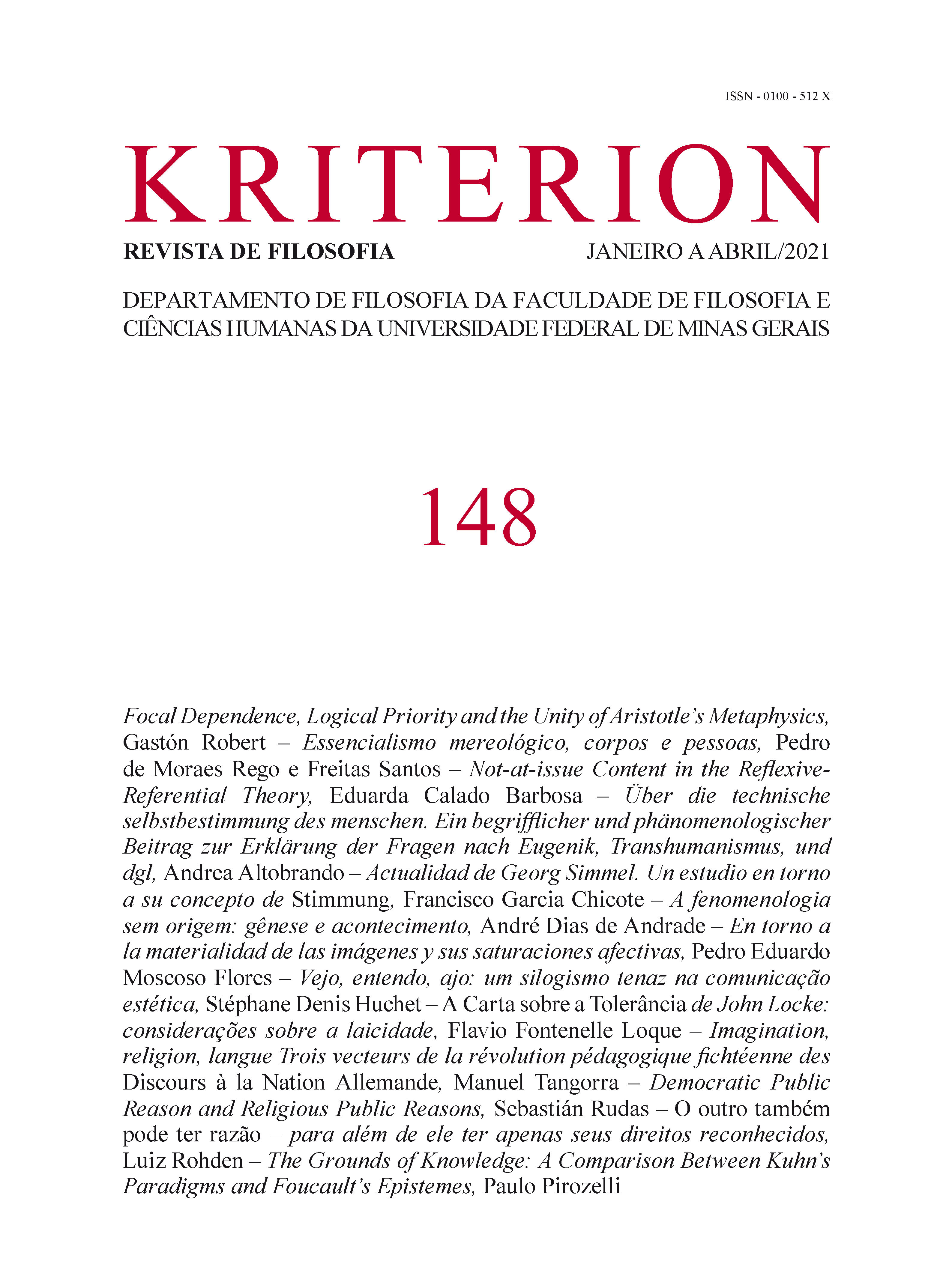DEMOCRATIC PUBLIC REASON AND RELIGIOUS PUBLIC REASONS
Palavras-chave:
political justification, democracy, religion, accessibility, social integration, public reasonResumo
According to the democratic interpretation of public reason, political justification ought to appeal to the tacit dimension or common sense of society’s actual historical moment. This article claims that a consequence of this interpretation is that religious reasons can be stable public reasons. More specifically, it claims that religious reasons can be public reasons in pervasively religious communities that are democratic, even in circumstances of ongoing social secularization. Three theoretical consequences are derived from this claim: first, democratic public reason assumes more social integration than other interpretations of public reason; second, religious reasons are not always inaccessible to non-believers; and third, religious reasons, when public reasons, can have normative force upon non-believers. Additionally, the following practical implication is made explicit: while justification of state power can appeal to religious reasons only, the law cannot be written in religious terms.
Referências
ANDERSON, E.; PILDES, R. H. “Expressive Theories of Law: A General Restatement.” University of Pennsylvania Law Review, Vol. 148, Nr. 1503, pp. 1503-1575, 2000.
BADANO, G.; BONOTTI, M. “Rescuing Public Reason Liberalism’s Accessibility Requirement.” Law and Philosophy, (online first), pp. 1-31, 2019.
BARDON, A. “Is Epistemic Accessibility Enough? Same-sex Marriage, Tradition, and the Bible.” Critical Review of International Social and Political Philosophy, (online first), pp. 21-35, 2018.
BARDON, A; LABORDE, C (eds.). “Religion in Liberal Political Philosophy.” Oxford: Oxford University Press, 2017.
BILLINGHAM, P. “Convergence Justifications within Political Liberalism: A Defence.” Res Publica, Vol. 22, Nr. 2, pp. 135-153, 2016.
BILLINGHAM, P. “Convergence liberalism and the problem of disagreement concerning public justification.” Canadian Journal of Philosophy, Vol. 47, Nr. 4, pp. 541-564, 2017.
BOETTCHER, J. W. “Against the Asymmetric Convergence Model of Public Justification.” Ethical Theory and Moral Practice, Vol. 18, Nr. 1, pp. 191-208, 2015.
BOHMAN, J.; RICHARDSON, H. S. “Liberalism, Deliberative Democracy, and “Reasons that All Can Accept.”” Journal of Political Philosophy, Vol. 17, Nr. 3, pp. 253-274, 2009.
BONOTTI, M. “Partisanship and Political Liberalism in Diverse Societies.” New York: Oxford University Press, 2017.
CALLAN, E. “Creating Citizens. Political Education and Liberal Democracy.” Oxford: Oxford University Press, 1997.
EBERLE, C. J. “Religious Conviction in Liberal Politics.” Cambridge University Press, 2002.
FRANCISQUINI, R. “On The Limits of Free Speech: Towards the Fair Value of Communicative Liberties.” Brazilian Political Science Review, Vol. 9, Nr. 1, pp. 65-92, 2015.
GAUS, G. “Public Reason Liberalism.” In: S. Wall (ed.), 2015. pp.112-140.
GAUS, G.; VALLIER, K. “The roles of religious conviction in a publicly justified polity: The implications of convergence, asymmetry and political institutions.” Philosophy and Social Criticism, Vol. 35, Nr. 1-2, pp. 51-76, 2009.
GEERTZ, C. “Local Knowledge: Further Essays in Interpretive Anthropology.” New York: Basic Books, 1983.
HABERMAS, J. “Contributions to a Discourse Theory of Law and Democracy.” Polity Press, 1996.
HABERMAS, J. “Between Naturalism and Religion: Political Essays.” Cambridge: Polity Press, 2008.
LABORDE, C. “Political Liberalism and Religion: On Separation and Establishment.” Journal of Political Philosophy, Vol. 21, Nr. 1, pp. 67-86, 2013.
LABORDE, C. “Liberalism’s Religion.” Cambridge: Harvard University Press, 2017.
LABORDE, C. “Three cheers for liberal modesty.” Critical Review of International Social and Political Philosophy, p. 1-17, 2018.
LÆGAARD, S. “What’s the Problem with Symbolic Religious Establishment? The Alienation and Symbolic Equality Accounts.” In: A. Bardon, C. Laborde (eds.), 2017. p. 118-131.
MACEDO, S. “Why Public Reason? Citizens’ Reasons and the Constitution of the Public Sphere.” Manuscrito disponível na Social Science Research Network. 2010. Disponível em: https://ssrn.com/abstract=1664085.
MACLURE, J.; TAYLOR, C. “Secularism and Freedom of Conscience.” Cambridge, London: Harvard University Press, 2011.
MILLS, C. W. ““Ideal Theory” as Ideology.” Hypatia, Vol. 20, Nr. 3, pp. 165-184, 2005.
NUSSBAUM, M. “Liberty of Conscience.” Paperback ed. New York: Basic Books, 2009.
PAREKH, B. C. “Rethinking Multiculturalism: Cultural Diversity and Political Theory.” Harvard University Press, 2002.
QUONG, J. “Liberalism without Perfection.” New York: Oxford University Press, 2011.
QUONG, J. “Public Reason.” The Stanford Encyclopedia of Philosophy, 2018. Disponível em: https://plato.stanford.edu/archives/spr2018/entries/public-reason/.
RAWLS, J. “Political Liberalism.” Paperback ed. New York: Columbia University Press, 2005.
ROSENBLUM, N. L. “Religious Parties, Religious Political Identity, and the Cold Shoulder of Liberal Democratic Thought.” Ethical Theory and Moral Practice, Vol. 6, Nr. 1, pp. 23-53, 2003.
RUDAS, S. “Lack of Pluralism and Post-Secularism in Catholic Politics.” Constellations, An International Journal of Democratic and Critical Theory, (online first), pp. 1-15, 2020. https://doi.org/10.1111/1467-8675.12461.
TYNDAL, J. “Public reason, non-public reasons, and the accessibility requirement.” Canadian Journal of Philosophy, (online first), pp. 1-21, 2019.
VALLIER, K. “Convergence and Consensus in Public Reason.” Public Affairs Quarterly, Vol. 25, Nr. 4, pp. 261-279, 2011.
VALLIER, K. “Liberal Politics and Public Faith.” New York: Routledge, 2014.
WALL, S (ed.). The Cambridge Companion to Liberalism. Cambridge: Cambridge University Press. 2015.
WHITE, J.; YPI, L. “Rethinking the Modern Prince: Partisanship and the Democratic Ethos.” Political Studies, Vol. 58, Nr. 4, pp. 809-828, 2010.
WHITE, J.; YPI, L. “On Partisan Political Justification.” American Political Science Review, Vol. 105, Nr. 2, pp. 381-396, 2011.
WHITE, J.; YPI, L. “The Meaning of Partisanship.” Oxford: Oxford University Press, 2016.










